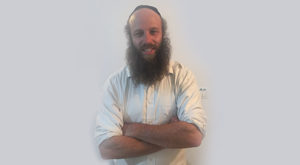Know This: Mental Illness

B

I’m married. I have children. I own a home. I have a job. I’m the luckiest girl in the world.
I watch the smiles on other people’s faces and smile back. But my smile is just a mask. Inside I’m crying. Inside my heart breaks. My heart and mind are forever marred by a disease called mental illness.
A myriad of medications litter my bureau, enabling me to function. I go to therapy. But even with all the help that I get, I could still slip off the tightrope I walk each day.
I was always a sad person. When I was young, I thought that I was a healthy person in a bad situation. My home life was tough: my parents were divorced; my mother didn’t know how to parent.
I tried everything in my power to crawl out of the hole I was in. I wrote and wrote and wrote. I played the piano, composing songs of hope, singing my heart out. I spoke to friends on the phone. I found mother figures to help me navigate the world. How hard I prayed, soaking the pages of my siddur with my tears. All good forms of therapy, all good coping skills.
But there was an illness within me that I didn’t know about. A chemical imbalance that no amount of writing, playing, or talking would ever erase.
There was something inside making me sad.
It wasn’t until after I was married with two children of my own that I stumbled upon an article that described my illness, that explained my persistent, heavy sadness and crying bouts. This is me, I thought.
The following day I booked an appointment with the psychiatrist who diagnosed me with mental illness.
“Is it chronic?” I asked him.
“Yes. You'll always be ill,” he answered.
It took years to find the right dosage of the medicine that would help me stop crying and stop wanting to leave This World. There were many roadblocks: Medication is expensive. Psychiatry is expensive. Therapy is expensive. Medication stops working. You have the outside world with its ups and downs interrupting everything that the medication had under control.
But giving up isn’t an option. I have children; they need a mother.
When I think back to my 30-year-old self discovering that I was sick, I think if only someone had noticed, if only I’d read about this earlier. We need more awareness; we need more people to speak up. Where I live — in the very center of Jewish life — there is not one frum support group for people suffering from mental illness.
The names of good psychiatrists are relayed in hushed tones. I’ve been asked not to speak about my diagnoses. Even my psychiatrist, who isn’t frum, told me not to tell anyone that I'm mentally ill.
There’s so much stigma surrounding mental illness. It’s embarrassing. It has the potential to be life shattering. You could lose your friends, your job, even your marriage and your children. No one wants to live with a sad person. No one gives custody to a parent who is on anti-psychotic meds. Nobody wants a mentally unstable person to be their child’s teacher, bus driver, or nurse.
That’s why we stay quiet. Mental illness is easy to hide. I’ve done it my whole life, with just a few flare ups along the way. I can smile the whole day through as my heart breaks into a million pieces.
But I want you to know: People with mental illness are people too. We are people who want to survive, to live, to be normal. We deserve the same dignity given people who suffer from cancer. Mental illness is just as debilitating as diabetes, Parkinson’s, and Alzheimer’s. People die from mental illness at the same rate as those who have other diseases.
Mental illness is real; it’s not just in our minds. It’s an invisible tumor — and its effects can be deadly and devastating. “It could be worse,” people have told me. “At least it’s not cancer.” But honestly, I’d prefer cancer to mental illness. At least cancer is something you can see. At least a tumor can be removed. And if not, one can die. Not by suicide, but by the hand of G-d. I have no choice but to live with my invisible tumor.
It took me a long time to be able to speak so frankly of my hidden illness — and I’m still too scared to do so under my name — but I’ve come to realize that sharing my story is as important as surviving it.
And maybe, after you’ve heard it, the next time I reach out, instead of judging me or offering unsolicited advice, you can just offer your hand and hold mine. Maybe you’ll stop seeing me as a crazy person and start seeing me as a survivor — someone who’s just trying to live, when living is the hardest thing in the world.
The Best Thing Anyone’s Ever Done for Me
During a recent downfall into depression, my friend made me Shabbos food for two months straight. She texted me every day just to ask how I was doing. I was so debilitated by constant panic attacks and depression that all I could say was thank you. Thank you for making Shabbos possible, thank you for caring, and thank you for just being there. That was all I needed.
You Probably Never Knew That
There are so many different diagnoses when it comes to mental illness, and because mental illness can’t be definitely diagnosed with a blood test, many people go misdiagnosed or mis-medicated. Some people never heal.
Medication is a constant game. I have yet to find one that works, and this is after seven years of therapy and psychiatry. Even when you find the right combination of pills, events in your life can throw everything off, and you may find yourself sicker than you ever were.
Do Say
“How are you today?”
“Do you need anything?”
“I’m here for you even though I don’t understand.”
“I realize that this illness has no face, no scientific proof, nor visible side effects… but I know it hurts. What you have is real.”
Don’t Say
“You’re lucky! There are so many people who are worse off.”
“So, once you take the medication, you’re good to go, right?”
“You should be more positive. Your view on life is too negative. Do what I do: Start a positivity journal, it will definitely cure your bad mood!”
I know I’m blessed, but the brain Hashem gave me keeps tricking me and telling me otherwise. Trust me, I’d love to be as positive as you are. It’s just not that simple.
(Originally featured in Family First, Issue 674)
Oops! We could not locate your form.








